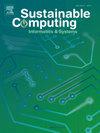Smart home Demand-Side Management Based on rooftop deep learning photovoltaic power forecasting
IF 5.7
3区 计算机科学
Q1 COMPUTER SCIENCE, HARDWARE & ARCHITECTURE
引用次数: 0
Abstract
Price-responsive consumers in smart homes can apply Demand-Side Management to controllable loads, based on the availability of energy produced from rooftop photovoltaic systems and on contractual tariffs, ultimately enhancing household energy efficiency and reducing operational costs. However, several key research gaps remain unaddressed: the limited integration of Photovoltaic power forecasting with optimal load scheduling, the underutilization of Numerical Weather Predictions to improve forecasting accuracy, and the lack of comprehensive scheduling strategies for heterogeneous loads, such as shiftable, curtailable, and sheddable appliances To bridge these gaps we propose an integrated methodology that predicts energy generation and optimizes the load allocation upon energetic and economic criteria. Since low forecast accuracy worsens load scheduling, forecasting systems based on deep learning-based architectures are developed and compared. The novel day-ahead scheduling module is formulated as a Mixed Integer Constrained Nonlinear Programming problem, solved with a Differential Evolution Algorithm. The proposed approach is applied to a real household equipped with a rooftop photovoltaic system. Results show that our method achieves up to 48% additional economic savings and reduces visual and thermal discomfort by six and one orders of magnitude, respectively, compared to an unscheduled operation.
基于屋顶深度学习光伏发电预测的智能家居需求侧管理
智能家居中对价格敏感的消费者可以根据屋顶光伏系统产生的能源的可用性和合同关税,将需求侧管理应用于可控负荷,最终提高家庭能源效率并降低运营成本。然而,几个关键的研究空白仍未得到解决:光伏发电预测与最优负荷调度的集成有限,数值天气预报在提高预测准确性方面的利用不足,以及缺乏针对异构负荷(如可移动、可削减和可卸载设备)的综合调度策略。为了弥补这些差距,我们提出了一种综合方法,根据能源和经济标准预测发电量并优化负荷分配。由于预测精度低会影响负荷调度,因此开发并比较了基于深度学习的预测系统。该新型日前调度模块被表述为一个混合整数约束非线性规划问题,用差分进化算法求解。该方法被应用于一个安装了屋顶光伏系统的真实家庭。结果表明,与非计划作业相比,我们的方法可节省高达48%的额外经济成本,并将视觉和热不适分别减少了6个数量级和1个数量级。
本文章由计算机程序翻译,如有差异,请以英文原文为准。
求助全文
约1分钟内获得全文
求助全文
来源期刊

Sustainable Computing-Informatics & Systems
COMPUTER SCIENCE, HARDWARE & ARCHITECTUREC-COMPUTER SCIENCE, INFORMATION SYSTEMS
CiteScore
10.70
自引率
4.40%
发文量
142
期刊介绍:
Sustainable computing is a rapidly expanding research area spanning the fields of computer science and engineering, electrical engineering as well as other engineering disciplines. The aim of Sustainable Computing: Informatics and Systems (SUSCOM) is to publish the myriad research findings related to energy-aware and thermal-aware management of computing resource. Equally important is a spectrum of related research issues such as applications of computing that can have ecological and societal impacts. SUSCOM publishes original and timely research papers and survey articles in current areas of power, energy, temperature, and environment related research areas of current importance to readers. SUSCOM has an editorial board comprising prominent researchers from around the world and selects competitively evaluated peer-reviewed papers.
 求助内容:
求助内容: 应助结果提醒方式:
应助结果提醒方式:


